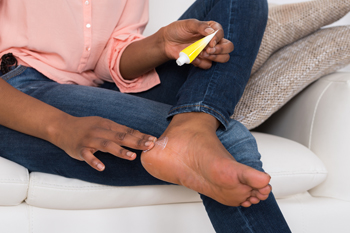
Cracked heels often stem from various factors, including obesity, wearing ill-fitting shoes, prolonged standing, and dry skin. When the skin on your feet lacks moisture and becomes stiff, it is more susceptible to cracking, especially under pressure while standing or walking. Certain conditions, such as diabetes, psoriasis, and flat feet, can further dry out the skin and increase the risk of cracked heels or painful fissures. Preventative measures include moisturizing regularly, avoiding harsh soaps, and opting for closed-heeled shoes with ample cushioning. Wearing cotton socks can also help to reduce friction. Mild relief typically involves moisturizers containing ingredients like urea or hyaluronic acid, which help retain moisture and soften the skin. While mild cases can often be managed at home, it is important to see a podiatrist if heel cracks are associated with a medical condition or if they have become infected. Seeking professional advice ensures a proper diagnosis and treatment, leading to quicker healing and long-term foot health. If cracked and painful heels are causing you discomfort, it is suggested that you schedule an appointment with a podiatrist.
Cracked heels are unsightly and can cause further damage to your shoes and feet. If you have any concerns, contact one of our podiatrists from Bergen Foot & Ankle. Our doctors can provide the care you need to keep you pain-free and on your feet.
Cracked Heels
Cracked heels appear unappealing and can make it harder for you walk around in sandals. Aside from looking unpleasant, cracked heels can also tear stockings, socks, and wear out your shoes. There are several methods to help restore a cracked heel and prevent further damage.
How Do You Get Them?
Dry skin is the number one culprit in creating cracked heels. Many athletes, walkers, joggers, and even swimmers suffer from cracked heels. Age and skin oil production play a role to getting cracked heels as well.
Promote Healing
Over the counter medicines can help, especially for those that need instant relief or who suffer from chronic dry feet.
Wear Socks – Wearing socks with medicated creams helps lock in moisture.
Moisturizers – Applying both day and night will help alleviate dryness which causes cracking.
Pumice Stones – These exfoliate and remove dead skin, which allows for smoother moisturizer application and better absorption into the skin.
Change in Diet
Eating healthy with a well-balanced diet will give the skin a fresh and radiant look. Your body responds to the kinds of food you ingest. Omega-3 fatty acids and zinc supplements can also revitalize skin tissue.
Most importantly, seek professional help if unsure how to proceed in treating cracked heels. A podiatrist will help you with any questions or information needed.
If you have any questions, please feel free to contact our offices located in Fort Lee, NJ and Flushing, NY . We offer the newest diagnostic and treatment technologies for all your foot care needs.
